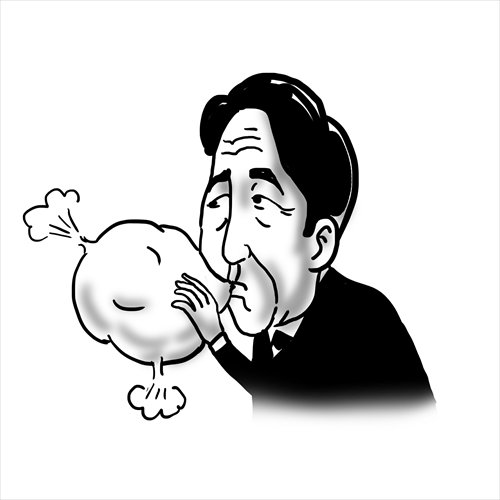Abenomics fails to produce long-term effect

Illustration: Liu Rui/GT
The Japanese government said on February 15 that Japan's GDP growth for the full year of 2015 was 0.4 percent, which dealt a further blow to Prime Minister Shinzo Abe's stimulus measures.
After the release of economic data, Abe responded to questions of the opposition about the failure of Abenomics at the Lower House Budget Committee and said the Japanese economy still has solid foundation as companies have made more profits than any other year and over 1.1 million new jobs were created.
Last year's GDP growth, though worse than forecast, doesn't necessarily indicate the failure of Abenomics. After the stimulus was introduced in 2013, Japan's GDP grew by 1.4 percent, zero and 0.4 percent annually in the following three years. The slow growth is nevertheless better than negative rate when the Democratic Party of Japan was in office.
According to statistics by Ministry of Health, Labor and Welfare on January 29, Japan's average ratio of active job openings to applicants in 2015 was 1.20, the highest since 1991. Earlier official releases put the 2015 unemployment rate at 3.4 percent, the lowest since 1997. In addition, the stock market rise, soaring profits of big companies and flooding of overseas tourists, all brought on by the weak yen, showed that Abenomics has to some degree boosted the sluggish Japanese economy.
However, lots of reasons still lead to the GDP growth of 0.4 percent. Yoshihide Suga, Japan's chief cabinet secretary, blamed an exceptionally warm winter for the weakness of consumption, and individual consumption, which makes up 60 percent of Japan's GDP, remains lackluster. In 2015, nearly 5 million Chinese tourists contributed about 1.41 trillion yen ($12.6 billion) to the Japanese economy and brought some stimulus to Japan. But compared with Chinese tourists with open wallets, Japanese consumers are rather conservative.
Besides, while Abenomics has pushed up the profits of big companies, it failed to benefit ordinary people. The consumption-tax hike in 2014 has considerably dampened Japanese willingness to spend money. Japan's economy also faces impacts from other countries such as slow growth of Asian countries including China, oil price slump in the Middle East, European debt and interest rate rise by the Federal Reserve.
An average GDP growth of 0.6 percent shows that Abenomics has only pushed up Japan's short-term development and may have limited effects in the long run because the Abe administration hasn't addressed the fundamental problems of Japan - labor shortage and aging society. The former will curb further economic development and the latter will affect Japan's domestic consumption. Abe's pledge to boost female labor participation rates results in nothing but several female members of his cabinet so far.
The slow GDP growth in 2015 may cause a butterfly effect on the Japanese economy. The steep plunge in the Japanese stock market and yen appreciation have dismayed Japan's financial market, which discords with Abenomics targets of stock rises and weak yen. If the trend continues, it will discourage investors in and out of Japan and the financial tumult will spread to the real economy. Meanwhile, a stronger yen will lead to decrease in the number of tourists to Japan, dealing a further blow to the Japanese market.
The low growth rate will also implicate Japan's political circle. The most important thing for Japanese politicians this year is the Upper House election in July. If the ruling party can secure its current number of seats, Abe will take a big step toward his goal of constitution revision.
However, Abe has lost the trust of the people with an array of actions including easing the ban on the rights to exercise collective self-defense and forcing through the security bills. Against this backdrop, if Japanese people no longer see tangible benefits from Abenomics, in the July election the opposition will likely make a comeback and Japanese political landscape may hence be altered.
All in all, the 2015 growth rate of 0.4 percent has revealed the problems of Abenomics.
The author is a PhD candidate at the Graduate School of Sociology at Toyo University. opinion@globaltimes.com.cn